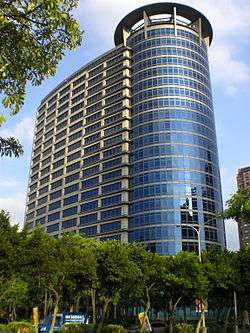Hakka Affairs Council
|
客家委員會 Kèjiā Wěiyuánhuì, Hak-kâ Ve-yèn-fi | |
|
Logo | |
 | |
| Agency overview | |
|---|---|
| Formed | 14 June 2001 |
| Jurisdiction | Taiwan |
| Headquarters | Taipei |
| Minister responsible |
|
| Parent agency | Executive Yuan |
| Website | www.hakka.gov.tw |
The Hakka Affairs Council (HAC; Chinese: 客家委員會; pinyin: Kèjiā Wěiyuánhuì, Hakka Pha̍k-fa-sṳ: Hak-kâ Ve-yèn-fi) is a cabinet-level unit under the Executive Yuan of the government of the Republic of China.[1]
History
The council was originally established on 14 June 2001 as Council for Hakka Affairs under the Democratic Progressive Party government.[2] On 1 January 2012, the council was renamed to Hakka Affairs Council.
Responsibilities
- Policies, system and laws and regulations relating to the comprehensive planning, coordination and promotion of Hakka affairs
- Deliberation, coordination and promotion of local and overseas Hakka affairs
- Promotion of Hakka language, in addition to planning and promotion of Hakka proficiency certification
- Planning and promotion of Hakka culture preservation and development
- Planning, coordination and promotion for Hakka cultural industry development, innovative incubation and marketing guidance
- Planning coordination and promotion for Hakka communication media and language culture promotion
- Supervision, coordination and promotion of organizations belonging to the Hakka culture
- Other Hakka related affairs
Organizational structures
- Taiwan Hakka Culture Development Center
- Accounting and Statistics Office
- Civil Service Ethics Office
- Personnel Office
- Secretariat
- Department of Communication and Marketing
- Department of Industrial Economy
- Department of Culture and Education
- Department of Planning
List of ministers
Political Party: Democratic Progressive Party Kuomintang Non-partisan/ unknown
| № | Name | Term of Office | Days | Political Party | Premier | |
|---|---|---|---|---|---|---|
| 1 | Fan Kuang-chun (范光群) | 14 June 2001 | 31 January 2002 | 231 | Democratic Progressive Party | Chang Chun-hsiung I |
| 2 | Yeh Chu-lan (葉菊蘭) | 1 February 2002 | 19 May 2004 | 838 | Democratic Progressive Party | Yu Shyi-kun |
| 3 | Luo Wen-jia (羅文嘉) | 20 May 2004 | 14 March 2005 | 298 | Democratic Progressive Party | Yu Shyi-kun Frank Hsieh |
| — | Lee Yung-te (李永得) | 15 March 2005 | 19 June 2005 | 96 | Democratic Progressive Party | Frank Hsieh |
| 4 | Lee Yung-te (李永得) | 20 June 2005 | 19 May 2008 | 1064 | Democratic Progressive Party | Frank Hsieh Su Tseng-chang Chang Chun-hsiung II |
| 5 | Huang Yu-cheng (黃玉振) | 20 May 2008 | 7 July 2014[3] | 2239 | Kuomintang | Liu Chao-shiuan Wu Den-yih Sean Chen Jiang Yi-huah |
| — | Liu Ching-chung (劉慶中) | 8 July 2014 | 4 August 2014 | 27 | Jiang Yi-huah | |
| 6 | Liu Ching-chung (劉慶中) | 5 August 2014 | 31 January 2016 | 544 | Jiang Yi-huah Mao Chi-kuo | |
| 7 | Chung Wan-mei (鍾萬梅) | 1 February 2016 | 19 May 2016 | 108 | Chang San-cheng | |
| (4) | Lee Yung-te (李永得) | 20 May 2016 | Incumbent | 198 | Democratic Progressive Party | Lin Chuan |
See also
References
External links
This article is issued from Wikipedia - version of the 10/29/2016. The text is available under the Creative Commons Attribution/Share Alike but additional terms may apply for the media files.


